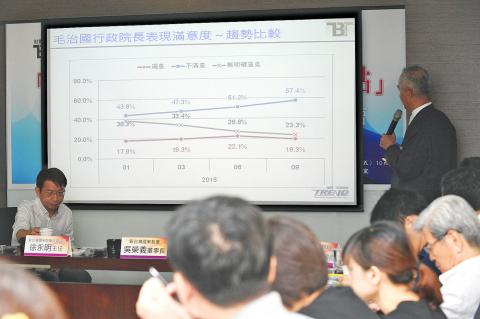President Ma Ying-jeou’s (馬英九) and Premier Mao Chih-kuo’s (毛治國) approval ratings remained low at 21.9 percent and 19.3 percent respectively, according to the newest poll by the Taiwan Brain Trust think tank.
In direct correlation to their low popularity, dissatisfaction with Ma and Mao stood at 69.9 percent and 57.4 percent respectively, the survey released yesterday showed.
The widespread public dissatisfaction with the Ma administration was also reflected in their dissatisfaction with the Chinese Nationalist Party (KMT), which stood at 71.8 percent.

Photo: Chen Chih-chu, Taipei Times
The Democratic Progressive Party (DPP) garnered a more favorable 42.3 percent satisfaction rating, but 45 percent also said they were dissatisfied with the party’s performance.
The poll found that 54.5 percent of respondents were confident about the DPP’s ability to maintain peaceful development of cross-strait relations should it win the presidential election next year, while 36 percent were unconvinced.
Asked whom they would support in the Jan. 16 presidential election if the candidates remained Tsai Ing-wen (蔡英文) of the DPP, Hung Hsiu-chu (洪秀柱) of the KMT and James Soong (宋楚瑜) of the People First Party, 46.8 percent of respondents chose Tsai, 17.2 percent picked Hung and 16.7 percent favored Soong.
Support for Soong dropped from 23.6 percent in July, when he ranked second.
Taiwan Brain Trust’s poll center director Hsu Yung-ming (徐永明) said the party’s decision to send PFP Secretary-General Chin Chin-sheng (秦金生) to attend the Chinese military parade in Beijing on Sept. 3 hurt support for Soong.
The decision also hurt the PFP’s legislator election standings, with the poll showing PFP party votes standing at 5.6 percent, trailing behind the New Power Party’s 6.8 percent.
When asked about their perceptions of former vice president Lien Chan’s (連戰) participation in the military parade, 52.1 percent of respondents said Lien’s participation had a negative effect on cross-strait relations, while 29.2 percent felt it had a positive contribution.
The poll showed that 54. 6 percent of respondents felt that the event in itself had a negative effect on the peaceful development of cross-strait relations, while 20.8 percent felt it had a positive effect.
It also found that 44.4 percent of respondents thought China to be the nation with the most influence on Taiwan’s presidential election, while 39.2 percent and 2.9 percent felt that the US and Japan respectively were the most influential.
If China were to vocally support a particular candidate, 85.6 percent of respondents said they would not support that candidate, while 6.3 percent said they would.
On economic issues, 64.2 percent said economic development is the primary issue in next year’s presidential election, followed by government effectiveness at 12.7 percent. Only 4.5 percent of polled individuals felt that cross-strait policies should be prioritized.
The poll found that 41.1 percent of respondents felt that Tsai was the most qualified to handle Taiwan’s economic problems, with Soong coming in second at 24.5 percent. Hung trailed at 9.8 percent.
The survey, conducted from Saturday last week to Monday, with 1,070 valid samples, has a margin of error of 3 percentage points.

A preclearance service to facilitate entry for people traveling to select airports in Japan would be available from Thursday next week to Feb. 25 at Taiwan Taoyuan International Airport, Taoyuan International Airport Corp (TIAC) said on Tuesday. The service was first made available to Taiwanese travelers throughout the winter vacation of 2024 and during the Lunar New Year holiday. In addition to flights to the Japanese cities of Hakodate, Asahikawa, Akita, Sendai, Niigata, Okayama, Takamatsu, Kumamoto and Kagoshima, the service would be available to travelers to Kobe and Oita. The service can be accessed by passengers of 15 flight routes operated by

Alain Robert, known as the "French Spider-Man," praised Alex Honnold as exceptionally well-prepared after the US climber completed a free solo ascent of Taipei 101 yesterday. Robert said Honnold's ascent of the 508m-tall skyscraper in just more than one-and-a-half hours without using safety ropes or equipment was a remarkable achievement. "This is my life," he said in an interview conducted in French, adding that he liked the feeling of being "on the edge of danger." The 63-year-old Frenchman climbed Taipei 101 using ropes in December 2004, taking about four hours to reach the top. On a one-to-10 scale of difficulty, Robert said Taipei 101

Taiwanese and US defense groups are collaborating to introduce deployable, semi-autonomous manufacturing systems for drones and components in a boost to the nation’s supply chain resilience. Taiwan’s G-Tech Optroelectronics Corp subsidiary GTOC and the US’ Aerkomm Inc on Friday announced an agreement with fellow US-based Firestorm Lab to adopt the latter’s xCell, a technology featuring 3D printers fitted in 6.1m container units. The systems enable aerial platforms and parts to be produced in high volumes from dispersed nodes capable of rapid redeployment, to minimize the risk of enemy strikes and to meet field requirements, they said. Firestorm chief technology officer Ian Muceus said

MORE FALL: An investigation into one of Xi’s key cronies, part of a broader ‘anti-corruption’ drive, indicates that he might have a deep distrust in the military, an expert said China’s latest military purge underscores systemic risks in its shift from collective leadership to sole rule under Chinese President Xi Jinping (習近平), and could disrupt its chain of command and military capabilities, a national security official said yesterday. If decisionmaking within the Chinese Communist Party has become “irrational” under one-man rule, the Taiwan Strait and the regional situation must be approached with extreme caution, given unforeseen risks, they added. The anonymous official made the remarks as China’s Central Military Commission Vice Chairman Zhang Youxia (張又俠) and Joint Staff Department Chief of Staff Liu Zhenli (劉振立) were reportedly being investigated for suspected “serious